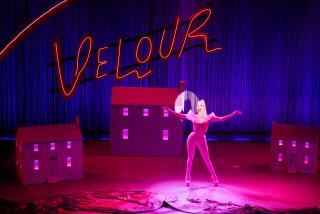Review: Before RuPaul, the documentary ‘Paris Is Burning’ illuminated drag
Over the past decade, Jennie Livingston’s landmark 1990 documentary “Paris Is Burning” has had a renaissance of sorts, thanks in no small part to the popularity of “RuPaul’s Drag Race.” Word is that host RuPaul requires the contestants to watch the influential documentary before filming, and its lingo peppers the show’s dialogue along with frequent references to the film. If you’ve never seen “Paris Is Burning,” you’re only getting half of what “Drag Race” has to offer, so a new restoration and theatrical re-release of the film courtesy of Janus Films is the perfect opportunity to catch up.
Livingston’s wildly entertaining, deeply humanitarian and fundamentally educational film has been restored and digitally remastered by the UCLA Film and Television Archive in conjunction with the Sundance Institute and Outfest UCLA Legacy Project, and though it’s nearly three decades old, it feels as vibrant and bracingly honest as it has always been.
Livingston dives into the ball scene of 1980s New York with an anthropologist’s eye and a big beating heart. White block letters on black backgrounds announcing a new teacher or subject serve as blackboard lessons. Here are the legendary house mothers Pepper LaBeija, Angie Xtravaganza and Willi Ninja. Here are lessons in “categories,” “reading,” “shade” and “mopping.”
The impossibly young African American and Latinx gay teens educate Livingston about the details of street life and ball life, while self-proclaimed “old-school” queen Dorian Corey serves as the educator about the finer points of language and the deeper sociocultural meanings of drag. The straight-shooting Corey always keeps it 100% real (though the footage shot in her apartment takes on a new, rather ghoulish meaning with the knowledge that a mummified body was discovered in the closet after her death in 1993).
Watching “Paris Is Burning” 30 years later doesn’t feel like discovering new, uncharted territory. Drag is big business now, with hours of weekly cable programming dedicated to “Drag Race” and Ryan Murphy and Steven Canals’ acclaimed series “Pose” on FX, which documents the same scene. Livingston’s warmth toward her subjects, and their youthful playfulness emanates off the screen, though the defiantly celebratory energy, embodied with such vigor by the stunning Venus Xtravaganza, is often spiked with stark reality checks about the mortal dangers of living as a trans woman or gay person of color. Unfortunately, that feels too familiar to dismiss as a product of the era.
There is such a strong sense of time in “Paris Is Burning,” in which Livingston has captured a specific moment of late ’80s excess, and how it interacted with gender, sexuality, class and race for racial and sexual minorities. More than anything else, the balls are about performing class than they are about performing gender. The balls allow a space for a gay black man to prove he can pass in the “executive realness” category when the real world might not think so. The ball creates a space for high-fashion swanning, evening-bag clutching, champagne-swilling and nautical sportswear when that is otherwise not afforded to the marginalized participants.
De facto narrator Corey speaks with directness about the class and racial structures that prevent queer people of color from achieving the kind of wealth that they emulate, and Livingston urgently pushes this message of class disparity and class performance, inserting shots of wealthy white New Yorkers and fashion magazines. It is called “voguing” after all.
It’s devastating to consider that so many of the subjects, who are so young in the film, are no longer alive, some due to AIDS-related illnesses. Ninja, Octavia St. Laurent and Angie Xtravaganza never made it to their 50th birthdays; LaBeija and Corey never saw 60. Venus Xtravaganza was found murdered in a hotel room during filming, and her death is a tragic, sobering moment that her mother Angie treats with a knowing sadness. But for a brief moment, they all glowed and glittered on the runway, twisting their lithe bodies into pretzel poses with ease. They were opulent. They owned everything. They burned bright and the light still hasn’t gone out.
-------------
‘Paris Is Burning’
Rated: R for language and sexuality
Running time: 1 hour, 17 minutes
Playing: Starts July 5, Landmark Nuart Theater, West L.A.
------------
More to Read
Only good movies
Get the Indie Focus newsletter, Mark Olsen's weekly guide to the world of cinema.
You may occasionally receive promotional content from the Los Angeles Times.










